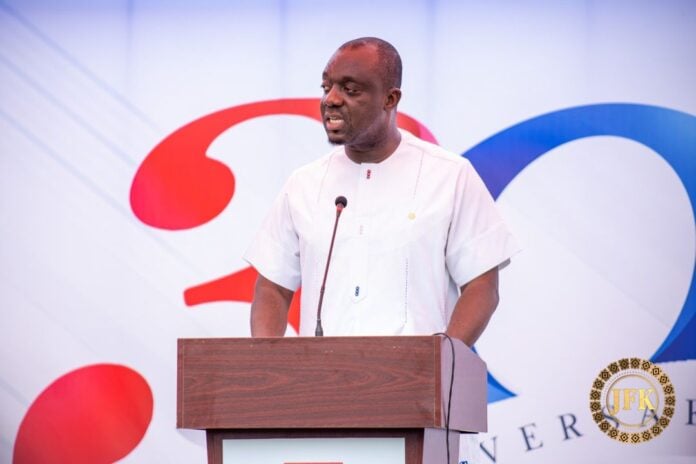The New Patriotic Party (NPP) experienced a significant electoral setback in the 2024 general elections, losing both the presidential and parliamentary races. This defeat has prompted introspection within the party, leading to a search for answers and explanations. Justin Frimpong Kodua, the General Secretary of the NPP, has offered a controversial perspective, suggesting that spiritual machinations played a crucial role in the party’s loss. He argues that a combination of spiritual attacks and withheld spiritual support contributed to the unprecedented low voter turnout among NPP supporters.
Kodua’s assertion centers around the belief that forces beyond the realm of conventional politics influenced the election results. He points to an unusually low voter turnout among NPP members across all sixteen regions of the country, suggesting a coordinated abstention that defies typical political explanations. This, he argues, points to a spiritual dimension that negatively impacted the party’s performance. He further claims that many pastors and prayerful individuals, who would typically intercede on behalf of the NPP, withheld their support due to unresolved grievances. This withdrawal of spiritual backing, according to Kodua, weakened the party’s position and contributed to the electoral defeat.
While acknowledging the importance of analyzing tangible political factors, Kodua emphasizes the need to consider the spiritual aspect in understanding the 2024 election outcome. He believes that a comprehensive analysis must encompass both the physical and spiritual realms to accurately assess the reasons behind the NPP’s loss. This perspective underscores the significance of spiritual support and intercession within the NPP’s political strategy, highlighting a belief that spiritual forces can impact real-world outcomes.
Kodua’s statements have sparked debate and discussion within the NPP and the broader political landscape. Some view his comments as an attempt to deflect responsibility from the party’s shortcomings, while others believe that exploring all possible factors, including spiritual influences, is essential for a complete understanding of the electoral defeat. The notion of spiritual warfare in politics is not uncommon in Ghana, and Kodua’s remarks tap into existing beliefs about the interplay between the spiritual and physical worlds. However, his claims also raise questions about the role of religious leaders in political processes and the potential for such beliefs to be used to explain away political failures.
The NPP is currently undertaking a fact-finding mission to pinpoint the root causes of its electoral setback. This investigation will likely explore a range of factors, from campaign strategies and messaging to voter demographics and economic conditions. Kodua’s assertion about spiritual influences adds another layer of complexity to this analysis, forcing the party to grapple with questions that extend beyond traditional political considerations. Whether the party accepts or dismisses Kodua’s spiritual explanation, the discussion itself highlights the diverse perspectives within the NPP and the challenges it faces in navigating both the political and spiritual landscape.
The 2024 election results represent a significant turning point for the NPP. The party’s efforts to understand the reasons behind its defeat will shape its future strategies and determine its ability to regain political ground. The debate surrounding Kodua’s comments reflects the broader soul-searching within the NPP as it attempts to reconcile its electoral expectations with the reality of its performance. Moving forward, the party will need to address both the tangible political factors and the intangible spiritual concerns raised by its members to effectively rebuild and prepare for future elections.














